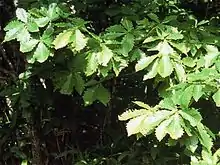Quercus mongolica
Quercus mongolica, commonly known as Mongolian oak, is a species of oak native to Japan, China, Korea, Mongolia, and Siberia.[1] The species can grow to be 30 metres (98 feet) tall.[3][4][5]

Foliage
| Mongolian oak | |
|---|---|
 | |
| Mongolian oak | |
| Scientific classification | |
| Kingdom: | Plantae |
| Clade: | Tracheophytes |
| Clade: | Angiosperms |
| Clade: | Eudicots |
| Clade: | Rosids |
| Order: | Fagales |
| Family: | Fagaceae |
| Genus: | Quercus |
| Subgenus: | Quercus subg. Quercus |
| Section: | Quercus sect. Quercus |
| Species: | Q. mongolica |
| Binomial name | |
| Quercus mongolica | |
| Synonyms[2] | |
|
List
| |
The flavono-ellagitannins mongolicin A and B can be found in Quercus mongolica var. grosseserrata.[6]
References
- Barstow, M. (2018). "Quercus mongolica". IUCN Red List of Threatened Species. 2018: e.T194200A2303793. doi:10.2305/IUCN.UK.2018-1.RLTS.T194200A2303793.en. Retrieved 19 November 2021.
- "Quercus mongolica Fisch. ex Ledeb.". World Checklist of Selected Plant Families. Royal Botanic Gardens, Kew – via The Plant List. Note that this website has been superseded by World Flora Online
- Huang, Chengjiu; Zhang, Yongtian; Bartholomew, Bruce. "Quercus mongolica". Flora of China. Vol. 4. Retrieved 2 November 2012 – via eFloras.org, Missouri Botanical Garden, St. Louis, MO & Harvard University Herbaria, Cambridge, MA.
- Ohwi, J. Flora of Japan, 1984. ISBN 978-0-87474-708-9
- Woody Plants of Japan, Vol. 1, 2000. ISBN 4-635-07003-4
- Tannins and related compounds. LXXI. Isolation and characterization of mongolicins A and B, novel flavono-ellagitannins from Quercus mongolica var. grosseserrata. Ishimaru K, Ishimatsu M, Nonaka G, Mihashi K, Iwase Y and Nishioka I, Chemical and Pharmaceutical Bulletin, 1988, volume 36, number 9, pages 3312–3318
This article is issued from Wikipedia. The text is licensed under Creative Commons - Attribution - Sharealike. Additional terms may apply for the media files.
